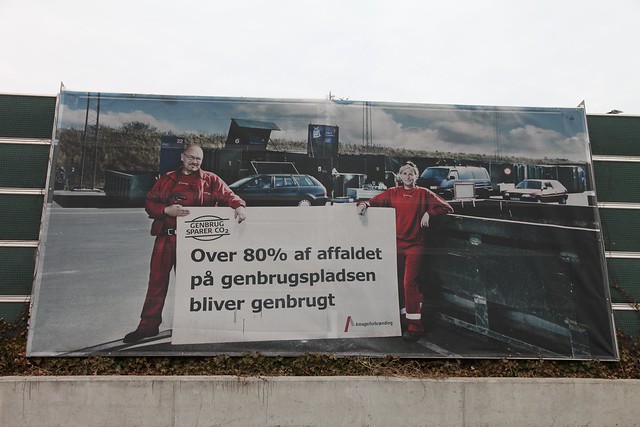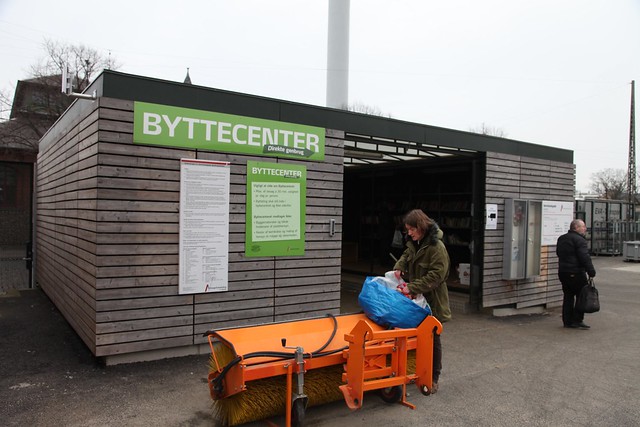by Peter Bjerregaard
 |
| "More than 80% of the waste in this disposal site is reused." |
Inside the recycling centre, a couple of little girls looks through an old box of pre-read books while an elderly man drops off his old 70's dresser. It is in these Danish drop-off stations that used goods get a new life.
In Denmark, the majority of waste is now being recycled and old waste disposal sites have evolved into highly efficient recycling sites. Recycling centres have made major inroads in recent years, and it has not happened by coincidence.
“Waste, such as metal, has become more valuable, so today it makes more sense to recycle it instead of throwing it out as we have done in the past few decades," says Merete Kristoffersen, Area Director at the Centre for Environment for the City of Copenhagen. She mentions that several municipalities have begun to recycle household waste, including even food leftovers.
Scarce resources
In the UN Sustainability Panel’s report on sustainable development last month, the key message was that pricing on the free market should rely on the “full cost”.
“We must ensure that it is not just the cost of production that determines the value of a product. The social and environmental costs must also be counted”, said Connie Hedegaard, EU Climate Commissioner during the presentation of the report.
The view is widely shared among economists. However, Bo Jellesmark Thorsen, Professor in Economics at Copenhagen University, foresees a number of practical problems."There is a certain amount of political support to correct prices through, for example, the introduction of green taxes. Similarly, there is some political support for paying for environmental benefits, like when we pay developing countries to avoid deforestation. But a key question for these good intentions is: What should the price be? What is the cost of pollution and what is the value of environmental goods?"
For Thorsen, as long as the price of the goods we consume does not reflect the real economic costs we will continue to consume more and produce more waste.
This waste contains materials, which under a proper pricing mechanism, would make it significantly more valuable.
“Certain types of waste in recent years have gone from being a burden to being a valuable resource on equal footing with commodities such as metals, biomass and oil," says Thorsen. Environmental goods like clean water and biodiversity can increasingly become integrated in economic models, marking a shift in which companies and countries begin to see resource management as a competitive parameter.

Physical Environment: A new pillar
When world leaders in politics, business and civil society met couple a months ago in Davos to discuss the state of the world under the title The Great Transformation: Shaping New Models, growth and sustainable development topped their agenda.
The World Economic Forum (WEF) annually ranks countries’ competitiveness through the Global Competitiveness Report. "The transition to a sustainable global economy is a necessity", the Report states this year. A new pillar is added to the measure of a country's competitiveness: Physical Environment. This new index measures the resource management of renewable resources and environmental degradation, and among other things it includes air pollution and its impact on the workforce’s health. The inclusion of a country's ability to preserve natural resources thus marks a shift in relation to the previous perception of what competitiveness is.
According to the WEF, resource efficiency can save the world economy $2 trillion by 2030 and it is not only at the WEF that resource efficiency is seen as a competitive element. The EU Commission will present a new paper at an informal ministerial meeting in April, which is expected to set out clear targets for European resource efficiency. The Danish government also plans to present their resource strategy at the end of this year.
Kim Füchsel, Managing Partner at the international audit and consulting firm PricewaterhouseCoopers, offers advice on a daily basis to Denmark’s largest companies, and nods with agreement towards the trend. He believes that resource efficiency is already a competitive factor.
“We are born with a savings account of natural resources, which we just carelessly use. There is not really someone who cares about the moment when the bankbook is empty. And as long as the full costs of manufacturing products is not included in the price, we will continue to see waste of resources and pollution," says Füchsel. He points out that the bill will have to be paid sooner or later and will thus affect long-term growth.
Back at the recycling centre, a fashionable young man reloads the 70s dresser into his trailer. He also takes an old flowerpot that lies in his way. He is helping to reduce approximately 400 kg of potential waste.

No comments:
Post a Comment